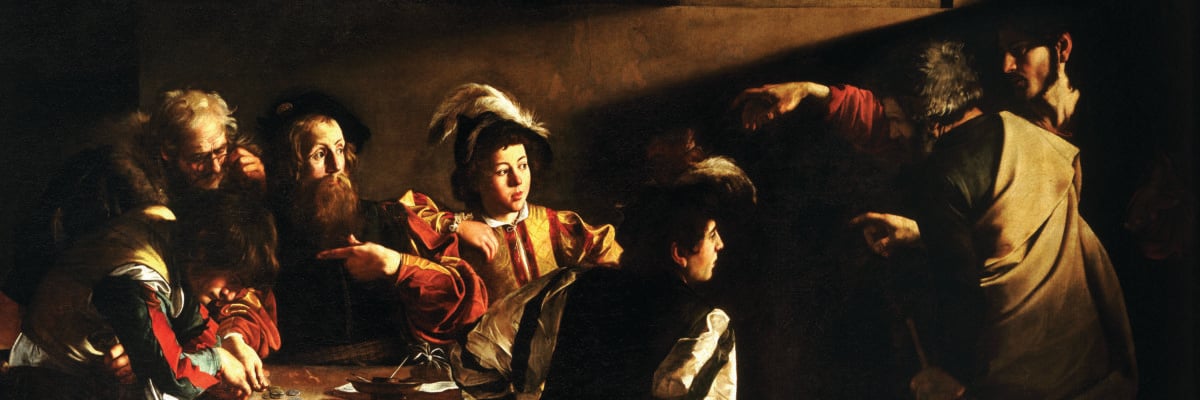
To the left of the altar in the church of San Luigi dei Francesi in Rome hang three Caravaggio paintings, scenes from the life of Matthew the apostle.
The first shows Jesus calling Matthew to follow him. The second shows a much older Matthew writing his Gospel. And the third shows Matthew being killed for his witness to Jesus.
They are among the most beautiful objects in the world, but the first, the Calling of St. Matthew, is widely thought to be Caravaggio’s finest work. Jesus is young and vibrant, but we see only the side of his face and his hand, which is extended, pointing at Matthew. The chiaroscuro light comes from behind Jesus and shines directly into the face of Matthew, whose almost comical, almost heartbreaking expression suggests a complex emotional reaction to the call. He is at once astonished, uncertain, and deeply moved.
Peter, with his back to us, is whispering in the Messiah’s ear and seems to be asking Jesus, “Are you sure about this?” Peter’s hand also points at Matthew, but ambivalently, as if to say, “This is not our kind of people.”
Jesus has no interest in Peter’s concerns. His expression of serenity and gravity lets us know that his call of Matthew arises from depths within Jesus that none of the others in the room can fathom. Jesus, far wiser than they, knows exactly who he is calling, and nothing can move him to reconsider.
Here is the story as given in Matthew’s Gospel:
As Jesus passed on from there, he saw a man called Matthew sitting at the tax office; and he said to him, “Follow me.” And he rose and followed him.
And as he sat at table in the house, behold, many tax collectors and sinners came and sat down with Jesus and his disciples. And when the Pharisees saw this, they said to his disciples, “Why does your teacher eat with tax collectors and sinners?” But when he heard it, he said, “Those who are well have no need of a physician, but those who are sick. Go and learn what this means, ‘I desire mercy, and not sacrifice.’ For I came not to call the righteous, but sinners” (Matt. 9: 9-13).
You talking to me?
It is beyond doubt that Matthew knew who Jesus was well before Jesus looked at him and said, “Follow me.” Everyone in the area was aware of the healing and preaching that Jesus was doing all around the Sea of Galilee. And Capernaum, where Matthew worked, was essentially the home base of Jesus’ ministry.
Sitting each day in a public place, conducting public business, he would have heard the news almost as it happened. He would have met people who were sharing stories of the things Jesus said and did: a father telling of the sick child Jesus had healed, a prostitute reliving the moment Jesus had rebuked religious hypocrites.
But would Matthew have gone out with the crowds to see and hear Jesus for himself? Probably not.
However much his heart might have burned to meet Jesus, to see the miracles, to hear the preaching about the kingdom of God, Matthew seems to have thought such beautiful things were for others and not for himself.
Probably a multilingual and literate man, given his work as a tax collector, Matthew might have felt he did not belong among the great throngs of common people that Jesus seemed to love. What’s more, Matthew was not a very good Jew. He was a collaborator with the Roman occupiers, which made him an enemy to his own people. What would the Messiah want with a man such as him?
All around Matthew there was joy at the dawning of the kingdom of God, but he felt himself excluded. The kingdom, no matter how much he might want it, did not belong to him.
On the fateful day, as the crowds streamed past his customs post, Matthew would have known that Jesus was approaching, but he did not get up. He did not go out. Perhaps such a thing would have made him a fool in the eyes of the other officials. Perhaps it would have made him a target of his fellow Jews. Whatever was the case, Matthew suppressed the desires of his heart and did not move.
Certainly, he would have strained to see Jesus, maybe without letting others see him do it. Certainly, he would have hoped to hear a word or see a miracle as the Messiah passed. But he did nothing to make these hopes a reality. He remained seated even as Jesus approached.
Suddenly, he is there at the door. Why has he stopped? Why has he come to the customs post? The crowds wait to see. Matthew waits to see. Even now, Matthew does not know what is happening, until the eyes of the Messiah meet his own.
I indulge myself imagining the look on the face of Jesus, a wry smile that says, “You didn’t think I’d come for you, but here I am.”
With Jesus’ words “Follow me,” Matthew’s entire world shifts. He sees now that he has not understood the kingdom of God at all.
Gathering the sinners around him
The complications of his life did not mean that he had no place with the Messiah. His own moral failings had not excluded him. The joy of the kingdom was not just for the common people, the everyday Jews whom Jesus obviously loved. This love was for Matthew, as well.
Jesus paid a social cost at that moment, and Matthew would have been keenly aware of this. The crowds had seen Jesus rebuke the unjust and would have sniggered as they prepared for Jesus to rebuke these customs-takers, these betrayer Jews. By calling Matthew, Jesus put himself at odds with the expectations of the crowd, knowing full well how quickly a crowd can become a mob.
Before his fellow tax collectors could mock him, before the crowd could turn against him, Matthew was on his feet and following. What a haze of emotions must he have felt in that moment as he pursued Jesus down the main street of Capernaum, so vulnerable in the crowd, so amazed that this was really happening. Was the secret desire of his heart really being fulfilled?
Later, at dinner, how sheepish Matthew must have felt as the disciples of Jesus also paid a social cost for Matthew’s presence. These good Jews, these common folk, found themselves abused by Pharisees and questioned about things they really had no answers for. Why does your teacher eat with tax collectors and sinners?
By calling Matthew, Jesus had opened the door to a whole new group. Now, in addition to good common Jews such as Peter, and the officious, educated Jews such as the Pharisees, a new group was gathered around Jesus: bad Jews—tax collectors and sinners. Everyone had to adjust to this new reality. We can easily imagine all the little dramas of resentment and social repositioning that played out that evening.
This is where Matthew learned what kind of man Jesus was. Now he saw the heart of the one he had heard so much about. And it was just the opposite of what he probably expected from the Messiah. Wasn’t the Messiah the one who would reward the righteous and restore them to their proper place? Wasn’t he going to set things right so that the good people would get what they deserved? That’s not at all the same as, “I came not to call the righteous but sinners.”
Why would Jesus prefer sinners over the righteous, even to the point of calling Matthew and dining with Matthew’s friends, people who had persecuted some of the righteous people right there in the room? Jesus answers this when he tells the Pharisees, “Go and learn what this means, ‘I desire mercy, and not sacrifice.’”
Doing the right thing isn’t enough
For Jesus, the word righteousness does not seem to mean merely rule-following. Somebody is not “righteous” just because he avoids doing overt evil. Rather, for Jesus, the meaning of the word seems to be rooted in the teachings of the Jewish prophets, who constantly called the people to generosity and mercy. For him, the desire for God within Matthew’s heart is worth more than all the “righteous” deeds of the Pharisees. But, strangely, it is also worth more than the works of the good Jews and common folk who follow Jesus, such as Peter.
All the sacrifices that the Pharisees make, whether in the temple or in their daily lives, mean nothing without mercy in their hearts. The sacrifices do not make the person righteous; only mercy will. And this goes for the good Jews like Peter, as well. Just following the rules and living righteous lives does not make them righteous. They, too, need to have mercy on people such as Matthew and his friends.
Matthew is neither a noble Pharisee nor a common, salt-of-the-earth Jew. He does not presume to think the kingdom of God is for him. In fact, he figures he is excluded from it. But Jesus does not exclude him. No matter what the social cost, he calls Matthew to take a place right at the center of his messianic ministry.
Jesus calls himself a physician here, but he acts as a shepherd. He brings all the sheep together—Peter and his crowd, the Pharisees, and the tax collectors and sinners. If any of them want him, they must accept one another.
Jesus does not exclude anyone from following him. So long as the desire is there, Jesus says, “Follow me.” He seeks out and finds the desiring heart, just as he found Matthew. And when he finds the desiring heart, he pulls that person close to him no matter what anyone else thinks, says, or does. He scandalizes both the good and the wicked with his mercy. He simply loves those who will accept his love, showing no preference for the good over the evil or the religious over the nonreligious.
This is not to say he is satisfied to leave evildoers in their evil; nor does he leave the good to their own efforts. He calls everyone to what is truly good: fellowship with himself. He is the physician who makes them all well, if, like Matthew, they will only come with him when he calls.
A life transformed
As Caravaggio’s second and third paintings make clear, Matthew’s life is completely transformed by Jesus’ willingness to ignore social pressures. His rock-solid willingness to pay any cost to share his table with those who desire his friendship makes it possible for Matthew to become the man who later writes a Gospel and accepts martyrdom.
Jesus’ utter disregard for his own reputation reveals a fierceness for people over image. He could have played the part of the Messiah, but he did not. He could simply have ignored Matthew and his friends. No one, not even Matthew, would have called him wrong to do so.
But that is not Jesus. Jesus is the one who says, “Come to me, all who labor and are heavy laden, and I will give you rest. Take my yoke upon you, and learn from me; for I am gentle and lowly in heart, and you will find rest for your souls. For my yoke is easy, and my burden is light” (Matt. 11:28-30).
As he did with Matthew, Jesus points at us, beckons us, each waking moment of our lives. If we could only see the fierceness of his love, we would dare not ignore him.



